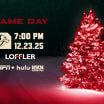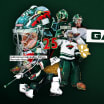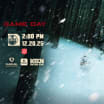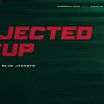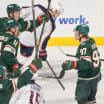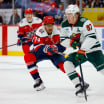The Minnesota Wild surpassed the halfway point of the 2016-17 regular season over the weekend when it defeated the Dallas Stars 5-4 in a dramatic win in the club's 41st game of the season.
With the 2016-17 campaign 50 percent over, Wild.com's Dan Myers takes a look at where things are at with a midseason progress report:
Midseason Progress Report: Wild is all 'A's
Historic first half has Wild among the NHL's best teams through 41 games
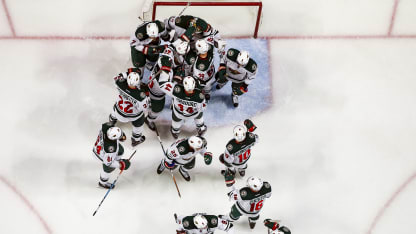
By
Dan Myers
Wild.com
Forwards: A
Many in Minnesota's forward group are finally realizing their full potential, and the results have been exciting over the first half of the season. A number of forwards are on pace to smash career highs in point totals -- or in the case of Jason Zucker, already have.
Centerman Eric Staal is unlikely to reach the 100-point plateau he reached in 2005-06, but his offseason addition has been perhaps the most savvy of any NHL team.
After scoring just 13 goals and adding 26 assists in 83 games with the Carolina Hurricanes and New York Rangers last season, Staal hit the free agent market off the worst offensive season of his career. At 31 years old, was his best hockey behind him?
If the first half of the season is any indication, Staal has plenty of gas left in the tank. The Thunder Bay, Ontario native already has 15 goals and 24 assists through 41 games, putting him on pace to approach 80 points in a season for the first time since he put up 82 in 2007-08.
Staal's bounce-back campaign has largely flown under the radar nationally, but should it continue, there's no reason why Staal shouldn't be in the MVP conversation at season's end.
The great start by Staal has overshadowed rock solid first halves by Charlie Coyle (13-21=34), Mikael Granlund (10-24=34), Mikko Koivu (13-17=30), Zucker (11-17=28) and Nino Niederreiter (11-15=26).
The Wild has never had more than two players reach the 60-point plateau in the same season, but is on pace to have four players hit the mark this season.
The forward group's play has helped overcome a tough first half by Zach Parise, who has battled injury and illness that caused him to miss nine games during the first half of the season.
Center Erik Haula, capable of getting red hot at any time (see the final six weeks of last season), also missed 10 games because of injury early in the season.
And don't forget the contributions of role players Chris Stewart and Jordan Schroeder. Stewart had a tough first couple months back in a Wild uniform, but has been very productive since the calendar turned to December. He's on pace for 16 goals and 22 points.
Schroeder played in just 11 games during the first half, but has chipped in three goals and six points on the fourth line, even bumping up to the top line in spurts late last month. He was especially big in a 3-2 win in Nashville coming out of the Christmas break when he dished out a pair of assists, including a pretty no-look set up to Jared Spurgeon for the overtime game-winner.
Defensemen: A-
Hard to argue with the results here, either; instead, the Wild will likely seek more consistency on the back end as the second half continues.
Ryan Suter got off to a red-hot start offensively, a pace that was unlikely to continue. And while he's on pace to finish shy of his career high of 51 points last season, Suter is just two scores away from matching the eight goals he had a year ago, which tied the most in his career. Suter's plus-27 is the best in the NHL, two better than Zucker and three better than Spurgeon, who round out the League's top three after 41 games played.
Spurgeon overcame injury early in the season to have a tremendous first half. After posting a career-best 29 points in 77 games last season, Spurgeon could approach 40 points this season.
Jonas Brodin's game has taken a giant step forward this season. After breaking into the NHL as a 19-year-old, Brodin appeared on track to be one of the League's best young defensemen. A bit of a down campaign last year, his fourth, slowed that momentum, but the 23-year old has been outstanding this year. Another on pace to smash his career best in points, Brodin has once again become one of the better defense-first defensemen in the NHL.
After scoring 10 goals in 81 games last season, Dumba is on pace to surpass all of his offensive numbers from a year ago. He's also become much more responsible defensively, posting a plus-19 over the first half. Still just 22 years old, Dumba, understandably, has inconsistency in his game. But when he's playing well, Dumba is one of the most exciting players on the roster.
Christian Folin was off to a wonderful start to the season, but an ill-timed knee injury put him on the shelf for three weeks. The 6-foot-3 Swede and Minnesota's most physical defenseman has been working his way back since returning in mid-December, but he showed what he is capable of over the season's first 20 games.
Marco Scandella has also battled injury, one that cost him 11 games during the season's first half. Statistically speaking, it's been a bit of a rough start for him, but he's on pace to be a plus player for the fourth consecutive season, and his massive slap shot certainly makes him capable of breaking out at any moment.
Wild coach Bruce Boudreau has been very pleased with Nate Prosser during his time in the lineup. Serving as a seventh defenseman, Prosser has played his role beautifully, chipping in a pair of assists in 17 games filling in for Folin both before and after his injury.
Goaltenders: A-
If they awarded a first-half Vezina Trophy, Devan Dubnyk likely would have won it after going 22-7-3 in 32 starts, posting a 1.77 goals-against average and a .940 save percentage with five shutouts.
The goals-against and save percentage numbers lead the League, while his five goose eggs are one back of NHL leader Braden Holtby.
Dubnyk has been especially impressive of late, having gone 15-1-2 over the final 18 games of the first half.
Backup goalie Darcy Kuemper has had success winning games, but will need to be better over the course of the second half, especially late in the season. Minnesota plays 16 games in the month of March, meaning Kuemper could see action in big games down the stretch.
Kuemper's 5-2-2 record is solid, but his goals-against average of 3.30 will need to go down while his save percentage of .901 must go up.
"We seem to win when he's in, but at the same time, he's going to have to get better," Boudreau said. "There's no doubt about it, he's been shaky. We can't afford, every game, to have three, four, five goals scored against us when he's in the net. I believe in him."
Coaching: A
Minnesota's 59 points through 41 games was far and away the best in franchise history, a term that has been thrown around a bunch over the first handful of months of the Boudreau era.
Just a sampling of new team records that have been set so far: longest win streak (12), longest point streak (13) and longest road point streak (11). The last of those was extended to 12 games on Sunday in Chicago in the 42nd game of the season and remains active.
The Wild finished the first half on a 16-1-1 run over its final 18 games, capturing 33 of a possible 36 points. Included in that stretch were road games in Montreal, New York, Nashville, San Jose, Anaheim, Los Angeles, Dallas and Chicago, all teams (besides the Canadiens) that made the Stanley Cup Playoffs last season and are in the postseason mix again this year.
Even more than the wins, the Wild has shown a remarkable ability to not break when falling behind. Minnesota had the worst record in the NHL last season when allowing the first goal and won just five times in such scenarios. It has already more than doubled that total and is now the best team when giving up the initial tally.
It's an attitude that has filtered from Boudreau and his staff down to the players.
"We don't think about needing to change things to come back, we just worry about playing our game and [we] know we're going to have a good chance if we do that," Dubnyk said.
Boudreau has even shown a remarkable ability to change on the fly, both on the micro and macro levels. If something isn't working in a game, he doesn't fear switching up his lines by demoting veterans or showcasing young talent.
"All I'm worrying about is winning that one game," Boudreau said.
He's also admitted that he favored styles in previous stops in Anaheim and Washington wouldn't work here. Boudreau had big, physical teams through the years with the Ducks, but the Wild is built differently. When Boudreau coaxed his new players to play more physical early in the season -- with mixed results -- Boudreau realized quickly that the square peg, round hole approach wouldn't work.
So he did something few veteran coaches are able and/or willing to: He adapted.
"When you'd look [in the past] and see 30 to 40 hits in a game then you see 13 or 14 hits [now] in a game, they had to convince me it'd work," Boudreau said. "And so far, it has, the first half anyway."
Boudreau's additions of assistants John Anderson and Scott Stevens are also paying dividends.
Anderson's quiet, veteran demeanor has been a boost to Minnesota's forward group, which has helped the Wild become one of the NHL's highest scoring teams.
Stevens has made a very good defensive core even better by introducing some of the habits that made him a Hall-of-Fame player and one of the finest defensemen in NHL history. You can see Stevens' fingerprints on the group every time the Wild is getting its sticks in lanes and killing penalties.
Backed by strong offensive performances, solid goaltending and smart coaching, Minnesota finished the first half as the only team in the Western Conference with fewer than 10 regulation losses. The Wild is one of just two League-wide with that distinction.

